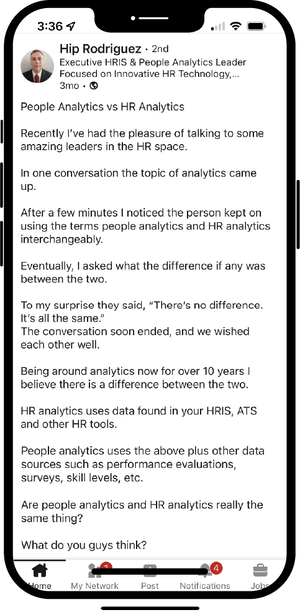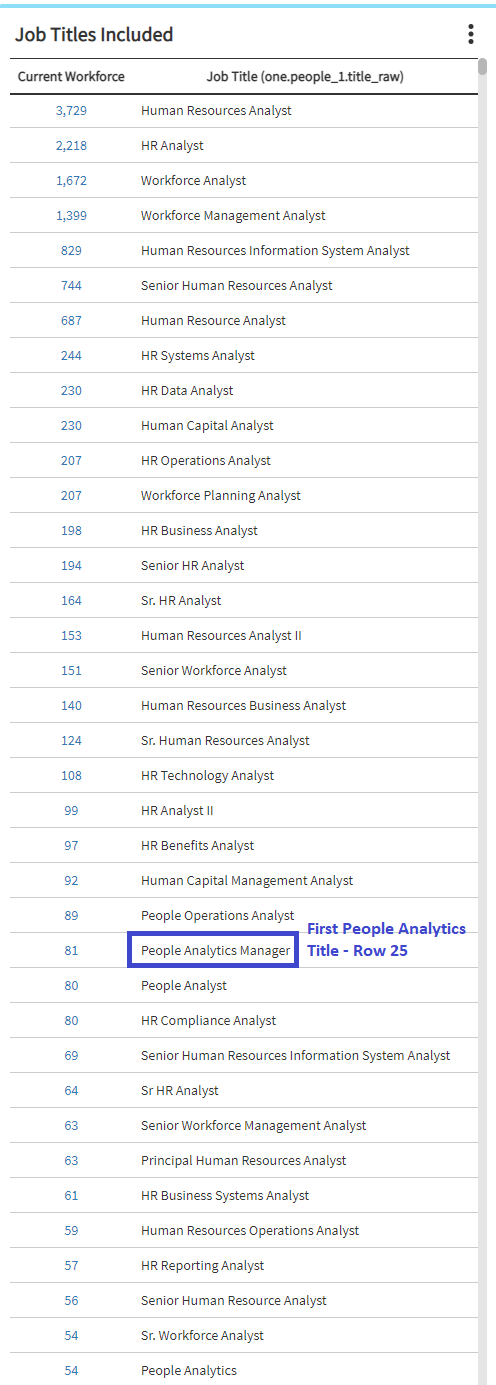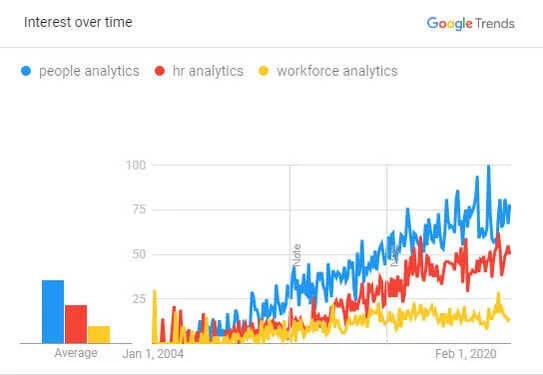When I first started work with InfoHRM in the people analytics domain back in 2006, we were the only vendor in the space and had been for over a decade. The product was called Workforce Analytics and Planning and after its acquisition by SuccessFactors (2010) and SAP (2012) it's still called that today.

So what's the difference? Why do we have Workforce Analytics, HR Analytics, and People Analytics and can they be used interchangeably?
I have to give credit to Hip Rodriguez for the subject of the blog. He posted about People Analytics vs HR Analytics a couple weeks ago and I've followed the conversation around it. Hip's Linkedin post here.
So what does the data say? Workforce vs HR vs People?
Being an analytical person at heart, I turned to the data and analyzed job titles containing "HR, Workforce, People, Human" and "Analytics or Analyst". As you can see in the table below (truncated for space), the data isn't supportive of people analytics being the most popular. In fact, you have to get down to row 25 before you see a people analytics title. HR Analytics and Workforce Analytics related titles are the clear leaders here by volume. Keep in mind though that titles particularly for less senior roles can take time to adapt, especially for more rigid position structures in larger organizations. Likely, many of these junior roles have a more basic reporting focus than an analytics focus.
So why then does it feel like People Analytics has become the dominant term for what we do?

The Evolution of HR Analytics (and my opinion)
I believe that it's not so much a difference between HR Analytics and People Analytics, but rather, an evolution in the term.
Let’s Start with the Evolution of Workforce Analytics
Early when we were delivering Workforce Analytics it was to only a handful of forward-thinking organizations that also had the budget to be able to take workforce reporting seriously. I specifically say reporting because mostly that's what it was: getting data in the hands of executives and directors weren't happening at scale so even basic data would blow people's minds. It's crazy how often the same basic data still blows people's minds 20 years later. There were not many teams running project focused analysis like there are today. For example: looking at drivers of turnover to trial different retention initiatives or how onboarding programs affect net promoter scores of recent hires.
Workforce Analytics was for the most part aggregate reporting. The analysis of this was primarily driven by hardcore segmentation of this data looking for nuggets of gold by a handful of curious people. It was done at scale with large numbers and rarely focused on small populations.
A Look at the Difference Between HR Analytics
HR Analytics is by far and away the most common term and has lived alongside Workforce Analytics for a very long time now. It is a natural extension of the naming of the human resources department, you're in HR and looking at HR data from our Human Resources Information System (HRIS) you are therefore an HR Analyst.
If we were to be more aligned with the term we would be analyzing the effectiveness and the efficiency of the HR function e.g. HR Staffing ratios and everything else that goes along with it. An HR Analyst in this fashion would be more aligned with Talent Acquisition Analyst roles that we see growing in the domain today.
In my view, HR Analytics is really no different to Workforce Analytics and we will see these titles transition towards People Analytics over time.
Why Evolve to People Analytics Then?
I do not believe there is a significant difference between people analytics vs HR analytics vs workforce analytics in terms of the work that we do.
The evolution of the terms, in my opinion, has been more about how we view people as individuals in our organizations as opposed to the large scale aggregate of a workforce or even worse to me as "human resources". We've recognized as a discipline that people need to be treated and respected as individuals, that we need to provide career development, and life support, and that it is important that people actually take vacation time. It is treating people as people and not numbers cranking out widgets.
It is no coincidence that knowledge worker organizations have been the biggest adopters of people analytics, they have the most to gain especially in the tight labor market where choice and compensation are abundant. The care for workers must exist whereas many years ago it was a different story. I love the fact that we have people analytics teams who are going deep on how they promote a diverse workforce, on how they create career development opportunities. We even have one customer that integrates cafeteria data into their solution to help identify what people are enjoying eating.
So is it just a branding change?
Yes, and No. Our space has definitely matured, and our capabilities have grown. We've moved from basic reporting and access to data which is now table stakes, to project-based analysis with intent and hypotheses to prove or dispel. People Analytics is a more mature discipline than it ever was but effectively the same activities could roll up under either term. Impacting people's work lives through our analysis of data is ultimately our goal, having in mind that outcome is why we'll see further adoption of People Analytics as a term. We'll see job titles change to reflect this move over time.

And I'm certainly not always right, and there are larger nuances between these terms applicable to some organizations. Heather Whiteman gives a good overview of a more nuanced definition here
Interested in Learning More?
So whether you call it HR Analytics or People Analytics, if you're new to this and want to understand what it can do for an organization, check out the eBook written by Heather White and Nicholas Garbis on Explore the Power of People Analytics for a further dive in this area.
Download eBook Today
